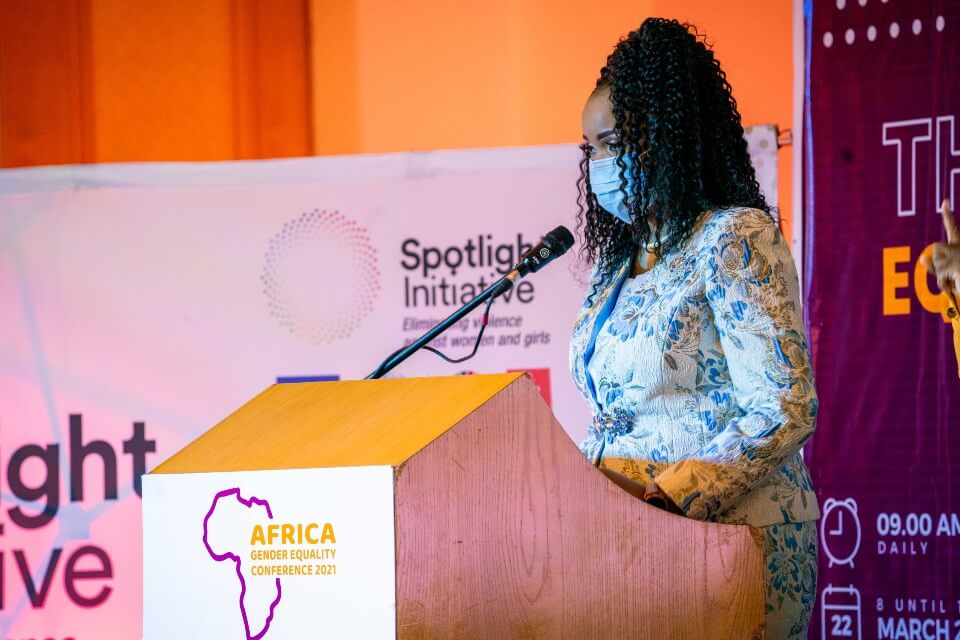Building pathways for ending violence against women and girls at the Africa Gender Equality Conference
Date:

“As we hear COVID-19 voices, stories and lived experiences of women and girls from across the continent on how the pandemic has effected them, it is my hope that we will all be propelled to action, both individually and collectively,” said Monica Chakwera, First Lady of the Republic of Malawi, speaking at the opening of the Annual Africa Gender Equality Conference.
Dubbed #AGEC2021, the first-ever Annual Africa Gender Equality Conference marked International Women’s Day in Lilongwe, Malawi, and across the continent. Over 2,500 participants from 38 countries took part in the 3-day conference under the theme “Women in leadership: Achieving an equal future in a COVID-19 world”. Participants from communities, government, civil society organizations, private sector, academia and media across the continent, including gender specialists, women’s rights activists and young people, came together to celebrate the advances made so far in gender equality and discuss solutions to emerging barriers and challenges posed by COVID-19. Sponsored by the Government of Malawi in partnership with an array of civil society organizations and the UN System in the country, the conference was also an opportunity to reflect on the journey of the women’s movement and the role of women and girls in shaping a more equal future while recovering from the pandemic.
Alongside the First Lady of Malawi, the spouse of the Vice President, Mary Chilima, Minister of Gender, Community Development and Social Welfare of Malawi Patricia Kaliati, Deputy Minister of Local Government of Malawi Halima Daud, and formerMinister of Investment, Trade and Industry of Botswana Bogolo Joy Kenewendo were among the many government officials, dignitaries and women leaders from all sectors of public life who participated in the conference.
A high-level side event on the EU-UN Spotlight Initiative to eliminate violence against women and girls offered a platform to assess progress and challenges in implementing the Initiative in Malawi and discuss promising practices to create a world free of violence for women and girls. As global and national statistics register a rise in cases of violence against women and girls, child marriages and unwanted teenage pregnancies since the start of the pandemic, with record numbers of rapes recorded in Malawi in 2020, the discussion highlighted the importance of working with boys and men to stop the violence and achieve gender equality. Efforts must focus on creating positive masculinities and challenging negative gender stereotypes, as well as creating spaces for men to become allies of feminist movements and agents of change, the panel noted.
“Everyone, including men and boys, must play their part in eliminating violence against women and girls. (…) As part of the Spotlight Initiative, the ‘Barbershop Toolkit’ provides a safe space for men to talk to each other. I think that dialogue ‘man to man’ is helping a lot (…) going not against men but against behaviours”, remarked María José Torres, UN Malawi Resident Coordinator, during the side event. Developed by the Government of Iceland with the support of UN Women, the Barbershop Toolkit was first launched globally by UN Women in 2017 as part of its HeForShe campaign. It is one of the many tools that UN Women uses in its work on engaging men and boys for gender equality, in Malawi and across the globe.
The 3-day conference, whose vibrant programme included panel discussions, survivors’ stories, capacity-building workshops, film screening and an all-female concert, culminated in the Africa Gender Equality Conference 2021 Declaration that captures the collective demand to put women at the centre of the COVID-19 response.